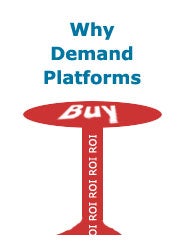 Demand-side platforms are becoming the rage. Whether you’re creating an agency platform strategy or offering white-label solutions for all ad buyers including ad networks, agencies or directs.
Demand-side platforms are becoming the rage. Whether you’re creating an agency platform strategy or offering white-label solutions for all ad buyers including ad networks, agencies or directs.
So, what’s driving the media buying platform trend and when will Nintendo release its console version?
I’ll leave the Nintendo version alone for now (Imagine “Dance Dance Revolution” for media buyers!). In its place, I’ll offer three overall factors.
First and foremost, data is driving this new trend toward buying platforms.
Data – with technology’s help – is bringing insight into media buying such that buyers can understand the value of impressions before they ever consummate a buy which in turn eliminates waste. Eventually, as real-time bidding takes hold, advertisers will be able to:
- Buy per impression
- Target using key advertiser data points
- Map to ROI goals
- And all in real-time eliminating waste as never before.
Efficiency in the digital marketplace only gets better from here – assuming that the heavy hand of regulation does not drop down too forcefully from above.
Second, agencies are eyeballing handsome, ad network gross margins of 40+% and saying, “I want that.”
By creating their own or licensing existing buying platforms, agencies will effectively begin to go around networks and directly to inventory sources in an attempt to grab that 40+%. As clients continue to squeeze the agencies for better deals, new ways of generating revenue and profit are key to the agency model and the holding companies.
Finally, as everyone knows, there is a huge amount of unsold, publisher inventory out there.
Publishers are cranking out more inventory than ever to make up for lost ad dollars in a difficult economic environment. Given the targeting abilities available today (behavioral, contextual, geo, etc.), it makes sense to use buying platforms on behalf of advertisers in order to aggregate valuable audiences from ad networks, exchanges and even directly from publishers.
Differentiating these platforms is another matter as each platform has its core strength focused somewhere between a mix of technology and service. Both will be valuable in this emerging, buying platform marketplace.











